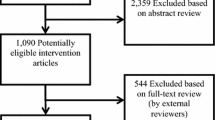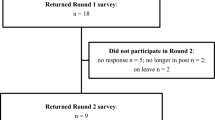Abstract
Therapeutic homework is a fundamental skill-building component of the majority of evidence-based therapies and is associated with better treatment outcomes. However, it is rarely utilized in public mental health settings. To determine barriers to homework use and identify predictors of clinicians’ assignment of homework, an online survey was administered to 267 clinicians in a large diverse public mental health system. Clinicians who were younger, licensed, whose supervisors asked about homework and whose clients completed their homework more frequently were predictors of greater homework utilization. The survey results are discussed and a novel idea to increase the use of homework is introduced.

Similar content being viewed by others
References
Aarons, G. A., Cafri, G., Lugo, L., & Sawitzky, A. (2012). Expanding the domains of attitudes towards evidence-based practice: The evidence based practice attitude scale-50. Administration and Policy in Mental Health and Mental Health Services Research, 39(5), 331–340.
Aarons, G. A., Ehrhart, M. G., Farahnak, L. R., & Sklar, M. (2014). Aligning leadership across systems and organizations to develop a strategic climate for evidence-based practice implementation. Annual Review of Public Health, 35, 255–274. https://doi.org/10.1146/annurev-publhealth-032013-182447.
Bertram, R. M., Charnin, L. A., Kerns, S. E. U., & Long, A. C. J. (2014). Evidence-based practices in North American MSW curricula. Research on Social Work Practice, 25(6), 737–748. https://doi.org/10.1177/1049731514532846.
Brookman-Frazee, L., Garland, A. F., Taylor, R., & Zoffness, R. (2009). Therapists’ attitudes towards psychotherapeutic strategies in community-based psychotherapy with children with disruptive behavior problems. Administration and Policy in Mental Health, 36(1), 1–12. https://doi.org/10.1007/s10488-008-0195-6.
Chacko, A., Anderson, L., Wymbs, B. T., & Wymbs, F. A. (2013). Parent-endorsed reasons for not completing homework in group-based behavioural parent training for high-risk families of youth with ADHD. Behavioural Change, 30(4), 262–272.
Chacko, A., Isham, A., Cleek, A. F., & McKay, M. M. (2016). Using mobile health technology to improve behavioral skill implementation through homework in evidence-based parenting intervention for disruptive behavior disorders in youth: Study protocol for intervention development and evaluation. Pilot and Feasibility Studies, 2(1), 57.
Clarke, A. T., Marshall, S. A., Mautone, J. A., Soffer, S. L., Jones, H. A., Costigan, T. E., … Power, T. J. (2015). Parent attendance and homework adherence predict response to a family-school intervention for children with ADHD. Journal of Clinical Child and Adolescent Psychology: The Official Journal for the Society of Clinical Child and Adolescent Psychology, American Psychological Association, Division, 53(1), 58–67. https://doi.org/10.1080/15374416.2013.794697.44.
Clough, B. A., & Casey, L. M. (2011). Technological adjuncts to increase adherence to therapy. A review. Clinical Psychology Review, 31(5), 697–710. https://doi.org/10.1016/j.cpr.2011.03.006.
Clough, B. A., & Casey, L. M. (2015). Therapy on the move: The development of a therapeutic smartphone application. International Journal of Cyber Behavior, Psychology and Learning (IJCBPL), 5(1), 33–41.
Coughlin, S. S. (1990). Recall bias in epidemiologic studies. Journal of Clinical Epidemiology, 43(1), 87–91. https://doi.org/10.1016/0895-4356(90)90060-3.
County of San Diego, Health and Human Services Agency, Behavioral Health Services. (2016). Behavioral health services: Workforce assessment report. San Diego, CA: County of San Diego, Health and Human Services Agency, Behavioral Health Services.
Cummings, C. M., Kazantzis, N., & Kendall, P. C. (2014). Facilitating homework and generalization of skills to the real world. Evidence-Based CBT for Anxiety and Depression in Children and Adolescents. https://doi.org/10.1002/9781118500576.ch11.
Ehrhart, M. G., Aarons, G. A., & Farahnak, L. R. (2014). Assessing the organizational context for EBP implementation: The development and validity testing of the Implementation Climate Scale (ICS). Implementation Science, 9(1), 157.
Fehm, L., & Kazantzis, N. (2004). Attitudes and use of homework assignments in therapy: A survey of German psychotherapists. Clinical Psychology & Psychotherapy, 11(5), 332–343. https://doi.org/10.1002/cpp.419.
Garland, A. F., Brookman-Frazee, L., & Chavira, D. A. (2010). Are we doing our homework? Clinical Psychology: Science and Practice, 17(2), 162–165. https://doi.org/10.1111/j.1468-2850.2010.01206.x.
Garland, A. F., Brookman-Frazee, L., Hurlburt, M., Accurso, E. C., Zoffness, R., Haine, R. A., & Ganger, W. (2010). Mental health care for children with disruptive behavior problems: A view inside therapists’ offices. Psychiatric Services (Washington, D.C.), 61(8), 788–795. https://doi.org/10.1176/appi.ps.61.8.788.
Garland, A. F., Hawley, K. M., Brookman-Frazee, L., & Hurlburt, M. S. (2008). Identifying common elements of evidence-based psychosocial treatments for children’s disruptive behavior problems. Journal of the American Academic of Child & Adolescent Psychiatry, 47(5), 505–514. https://doi.org/10.1097/chi.0b013e31816765c2.
Haine-Schlagel, R., & Walsh, N. E. (2015). A review of parent participation engagement in child and family mental health treatment. Clinical Child and Family Psychology Review, 18(2), 133–150. https://doi.org/10.1007/s10567-015-0182-x.
Hoagwood, K., Peth-Pierce, R., Glaeser, E., Whitmyre, E., Shorter, P. & Vardanian. M. M. (2017). Implementing evidence-based psychotherapies for children and adolescents within complex mental health systems. In J. Weisz & A. E. Kazdin (Eds.), Evidence-based psychotherapies for children and adolescents, (3rd ed.). New York: The Guilford Press
Högström, J., Enebrink, P., Melin, B., & Ghaderi, A. (2015). Eighteen-month follow-up of internet-based parent management training for children with conduct problems and the relation of homework compliance to outcome. Child Psychiatry and Human Development, 46(4), 577–588. https://doi.org/10.1007/s10578-014-0498-7.
Hudson, J. L., & Kendall, P. C. (2002). Showing you can do it: homework in therapy for children and adolescents with anxiety disorders. Journal of Clinical Psychology, 58(5), 525–534. https://doi.org/10.1002/jclp.10030.
Kazantzis, N., & Dattilio, F. M. (2010). Definitions of homework, types of homework, and ratings of the importance of homework among psychologists with cognitive behavior therapy and psychoanalytic theoretical orientations. Journal of Clinical Psychology, 66, 758–773. https://doi.org/10.1002/jclp.20699.
Kazantzis, N., Deane, F. P., & Ronan, K. R. (2000). Homework assignments in cognitive and behavioral therapy: A meta-analysis. Clinical Psychology: Science and Practice, 7(2), 189–202.
Kazantzis, N., Deane, F. P., & Ronan, K. R. (2004). Assessing compliance with homework assignments: Review and recommendations for clinical practice. Journal of Clinical Psychology, 60(6), 627–641.
Kazantzis, N., Lampropoulos, G. K., & Deane, F. P. (2005). A national survey of practicing psychologists’ use and attitudes toward homework in psychotherapy. Journal of Consulting and Clinical Psychology, 73(4), 742–748. https://doi.org/10.1037/0022-006x.73.4.742.
Kazantzis, N., Whittington, C., & Dattilio, F. (2010). Meta-analysis of homework effects in cognitive and behavioral therapy: A replication and extension. Clinical Psychology: Science and Practice, 17(2), 144–156. https://doi.org/10.1111/j.1468-2850.2010.01204.x.
Kelly, P. J., & Deane, F. P. (2011). Improving therapeutic use of homework: Suggestions from mental health clinicians. Journal of Mental Health, 20(5), 456–463. https://doi.org/10.3109/09638237.2011.577845.
Kelly, P. J., Deane, F. P., Kazantzis, N., & Crowe, T. P. (2007). Case managers’ attitudes toward the use of homework for people diagnosed with a severe psychiatric disability. Rehabilitation Counseling Bulletin, 51(1), 34–43.
Kelly, P. J., Deane, F. P., Kazantzis, N., Crowe, T. P., & Oades, L. G. (2006). Use of homework by mental health case managers in the rehabilitation of persistent and recurring psychiatric disability. Journal of Mental Health, 15(1), 95–101.
Kelly, P. J., Deane, F. P., King, R., Kazantzis, N., & Crowe, T. P. (2007). A taxonomy for homework used by mental health case managers when working with individuals diagnosed with severe mental illness. Community Mental Health Journal, 43(6), 565–581.
Kling, Å, Forster, M., Sundell, K., & Melin, L. (2010). A randomized controlled effectiveness trial of parent management training with varying degrees of therapist support. Behavioral Therapy, 41(4), 530–542. https://doi.org/10.1016/j.beth.2010.02.004.
Liang, K.-Y., & Zeger, S. L. (1986). Longitudinal data analysis using generalized linear models. Biometrika, 73(1), 13–22. https://doi.org/10.1093/biomet/73.1.13.
Mausbach, B. T., Moore, R., Roesch, S., Cardenas, V., & Patterson, T. L. (2010). The relationship between homework compliance and therapy outcomes: An updated meta-analysis. Cognitive Therapy and Research, 34(5), 429–438. https://doi.org/10.1007/s10608-010-9297-z.
Nakamura, B. J., Higa-McMillan, C. K., Okamura, K. H., & Shimabukuro, S. (2011). Knowledge of and attitudes towards evidence-based practices in community child mental health practitioners. Administration and Policy in Mental Health and Mental Health Services Research, 38(4), 287–300. https://doi.org/10.1007/s10488-011-0351-2.
Novins, D. K., Green, A. E., Legha, R. K., & Aarons, G. A. (2013). Dissemination and implementation of evidence-based practices for child and adolescent mental health: A systematic review. Journal of the American Academy of Child & Adolescent Psychiatry, 52(10), 1009–1025.e18. https://doi.org/10.1016/j.jaac.2013.07.012.
Ogden, T., & Hagen, K. A. (2008). Treatment effectiveness of parent management training in Norway: A randomized controlled trial of children with conduct problems. Journal of Consulting and Clinical Psychology, 76(4), 607–621. https://doi.org/10.1037/0022-006x.76.4.607.
Park, J. M., Small, B. J., Geller, D. A., Murphy, T. K., Lewin, A. B., & Storch, E. A. (2013). Does d-cycloserine augmentation of cbt improve therapeutic homework compliance for pediatric obsessive–compulsive disorder? Journal of Child and Family Studies, 23(5), 863–871. https://doi.org/10.1007/s10826-013-9742-1.
Podsakoff, P. M., MacKenzie, S. B., Lee, J. Y., & Podsakoff, N. P. (2003). Common method biases in behavioral research: A critical review of the literature and recommended remedies. Journal of Applied Psychology, 88(5), 879.
Ros, R., Hernandez, J., Graziano, P. A., & Bagner, D. M. (2016). Parent training for children with or at risk for developmental delay: The role of parental homework completion. Behavioral Therapy, 47(1), 1–13. https://doi.org/10.1016/j.beth.2015.08.004.
Southam-Gerow, M. A., & Prinstein, M. J. (2014). Evidence base updates: The evolution of the evaluation of psychological treatments for children and adolescents. Journal of Clinical Child & Adolescent Psychology, 43(1), 1–6. https://doi.org/10.1080/15374416.2013.855128.
Stokes, J. O., Jent, J. F., Weinstein, A., Davis, E. M., Brown, T. M., Cruz, L., & Wavering, H. (2016). Does practice make perfect? The relationship between self-reported treatment homework completion and parental skill acquisition and child behaviors. Behavioral Therapy, 47(4), 538–549. https://doi.org/10.1016/j.beth.2016.04.004.
Williams, N. J., Glisson, C., Hemmelgarn, A., & Green, P. (2017). Mechanisms of change in the ARC organizational strategy: Increasing mental health clinicians’ EBP adoption through improved organizational culture and capacity. Administration and Policy in Mental Health and Mental Health Services Research, 44(2), 269–283.
Author information
Authors and Affiliations
Corresponding author
Ethics declarations
Conflict of interest
All authors declare that they have no conflict of interest.
Ethical Approval
Ethics approval for this study was obtained from the UC San Diego Human Research Protection Program (HRPP). These data were collected as part of evaluation activities and analyses were conducted using an anonymized dataset.
Rights and permissions
About this article
Cite this article
Trask, E.V., Barounis, K., Carlisle, B.L. et al. Factors Associated with Assignment of Therapeutic Homework in a Large Public Children’s Mental Health System. Adm Policy Ment Health 45, 821–830 (2018). https://doi.org/10.1007/s10488-018-0867-9
Published:
Issue Date:
DOI: https://doi.org/10.1007/s10488-018-0867-9




